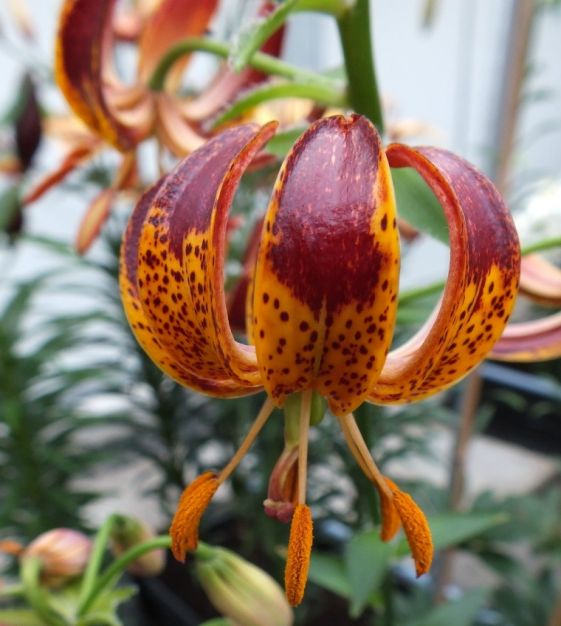-
- Website Specials
- New for 2025!
- Tulips
- Narcissi
- Allium
- Anemone blanda
- Brodiaea
- Camassia
- Chionodoxa
- Corydalis
- Crocus
- Eranthis
- Eremurus
- Erythronium
- Fritillaria
- Galanthus
- Geranium
- Gladiolus
- Hyacinths
- Hyacinthoides
- Ipheion uniflorum
- Dutch Iris
- Rock Garden Iris
- Ixiolirion
- Leucojum Aestivum
- Muscari
- Ornithogalum
- Oxalis
- Puschkinia
- Scilla
- Lilies
- Peonies
- Tender Bulbs
- Anemone Giants
- Tecolote Ranunculus
- Freesias
- Paperwhites
- Amaryllis
Lily martagon Arabian Knight
Arabian Knight has small, pendant, deep russet-red Turk’s Cap flowers with rich golden brushmarks overlaid with mahogany-red markings, smooth mahagony spots and elegant anther-tipped, pale gold stamens. A floriferous garden variety once established and mature, butterfly-beloved L. martagon Arabian Knight is best planted in the fall. It requires well-draining soil that is not humus-rich because it cannot tolerate getting wet feet. It prefers full to partial sun with its flowers and foliage in the sun, and its lower stalk in the shade. It likes it dry over the summer and hates any sort of root disturbance once planted. It may even hold off flowering the first year until it is well established. Once mature, it may yield 40+ flowers per stalk, like so many little hanging presents with fancy bows. Lily Class: Martagon (and Heirloom Species). Bulb size: 14/16 cm. June. HZ: 3-8. Height: 3' to 4'.
Lilies are The Art & Soul of Summer.
Lily Horticultural Tips
Lilies are The Art & Soul of Summer.
Lily Horticultural Tips
- Information
Heirloom Species Lilies
All floriferous garden varieties once mature, our butterfly-beloved Heirloom Species are best planted in the fall. They require well-draining, slightly alkaline, humus-rich soil, and full to partial sun and even moisture through the year. They dislike any sort of root disturbance once planted and prefer to have their flowers and foliage in the sun, and their lower stalk in the shade. While it is best to plant all Lily bulbs in the fall for mature root development, varieties of L. martagon must be planted in the fall. If one must separate, divide and transplant a mature clump of L. martagon, the best time to do so, according the experts, is actually while they are in bloom.
They may take longer to establish themselves than other Lilies, but once well-rooted and settled, Heirloom Species Lilies are strong growers, and will likely require thinning and transplant over time (best done in the fall). They naturalize by the creation of baby bulbs (bulblets or offsets) on the mother bulb. Apply no more than a 2" layer of leaf mulch once the ground surface has frozen in the fall and again in the late spring to keep the root zone cool. Deadhead spent flowers to avoid seed development and direct all of the energy back into the bulb for the future. Allow the foliage to thrive and die back naturally for maximum photosynthesis. Bulb size: 14/16 cm. Plant 6" deep and 12" apart. June-August depending on the variety. HZ: 3-8. Height: 3' to 7' and taller!
Lilies are The Art & Soul of Summer.
Lily Horticultural Tips
All floriferous garden varieties once mature, our butterfly-beloved Heirloom Species are best planted in the fall. They require well-draining, slightly alkaline, humus-rich soil, and full to partial sun and even moisture through the year. They dislike any sort of root disturbance once planted and prefer to have their flowers and foliage in the sun, and their lower stalk in the shade. While it is best to plant all Lily bulbs in the fall for mature root development, varieties of L. martagon must be planted in the fall. If one must separate, divide and transplant a mature clump of L. martagon, the best time to do so, according the experts, is actually while they are in bloom.
They may take longer to establish themselves than other Lilies, but once well-rooted and settled, Heirloom Species Lilies are strong growers, and will likely require thinning and transplant over time (best done in the fall). They naturalize by the creation of baby bulbs (bulblets or offsets) on the mother bulb. Apply no more than a 2" layer of leaf mulch once the ground surface has frozen in the fall and again in the late spring to keep the root zone cool. Deadhead spent flowers to avoid seed development and direct all of the energy back into the bulb for the future. Allow the foliage to thrive and die back naturally for maximum photosynthesis. Bulb size: 14/16 cm. Plant 6" deep and 12" apart. June-August depending on the variety. HZ: 3-8. Height: 3' to 7' and taller!
Lilies are The Art & Soul of Summer.
Lily Horticultural Tips
Heirloom Species Lilies
All floriferous garden varieties once mature, our butterfly-beloved Heirloom Species are best planted in the fall. They require well-draining, slightly alkaline, humus-rich soil, and full to partial sun and even moisture through the year. They dislike any sort of root disturbance once planted and prefer to have their flowers and foliage in the sun, and their lower stalk in the shade. While it is best to plant all Lily bulbs in the fall for mature root development, varieties of L. martagon must be planted in the fall. If one must separate, divide and transplant a mature clump of L. martagon, the best time to do so, according the experts, is actually while they are in bloom.
They may take longer to establish themselves than other Lilies, but once well-rooted and settled, Heirloom Species Lilies are strong growers, and will likely require thinning and transplant over time (best done in the fall). They naturalize by the creation of baby bulbs (bulblets or offsets) on the mother bulb. Apply no more than a 2" layer of leaf mulch once the ground surface has frozen in the fall and again in the late spring to keep the root zone cool. Deadhead spent flowers to avoid seed development and direct all of the energy back into the bulb for the future. Allow the foliage to thrive and die back naturally for maximum photosynthesis. Bulb size: 14/16 cm. Plant 6" deep and 12" apart. June-August depending on the variety. HZ: 3-8. Height: 3' to 7' and taller!
Lilies are The Art & Soul of Summer.
Lily Horticultural Tips
All floriferous garden varieties once mature, our butterfly-beloved Heirloom Species are best planted in the fall. They require well-draining, slightly alkaline, humus-rich soil, and full to partial sun and even moisture through the year. They dislike any sort of root disturbance once planted and prefer to have their flowers and foliage in the sun, and their lower stalk in the shade. While it is best to plant all Lily bulbs in the fall for mature root development, varieties of L. martagon must be planted in the fall. If one must separate, divide and transplant a mature clump of L. martagon, the best time to do so, according the experts, is actually while they are in bloom.
They may take longer to establish themselves than other Lilies, but once well-rooted and settled, Heirloom Species Lilies are strong growers, and will likely require thinning and transplant over time (best done in the fall). They naturalize by the creation of baby bulbs (bulblets or offsets) on the mother bulb. Apply no more than a 2" layer of leaf mulch once the ground surface has frozen in the fall and again in the late spring to keep the root zone cool. Deadhead spent flowers to avoid seed development and direct all of the energy back into the bulb for the future. Allow the foliage to thrive and die back naturally for maximum photosynthesis. Bulb size: 14/16 cm. Plant 6" deep and 12" apart. June-August depending on the variety. HZ: 3-8. Height: 3' to 7' and taller!
Lilies are The Art & Soul of Summer.
Lily Horticultural Tips





